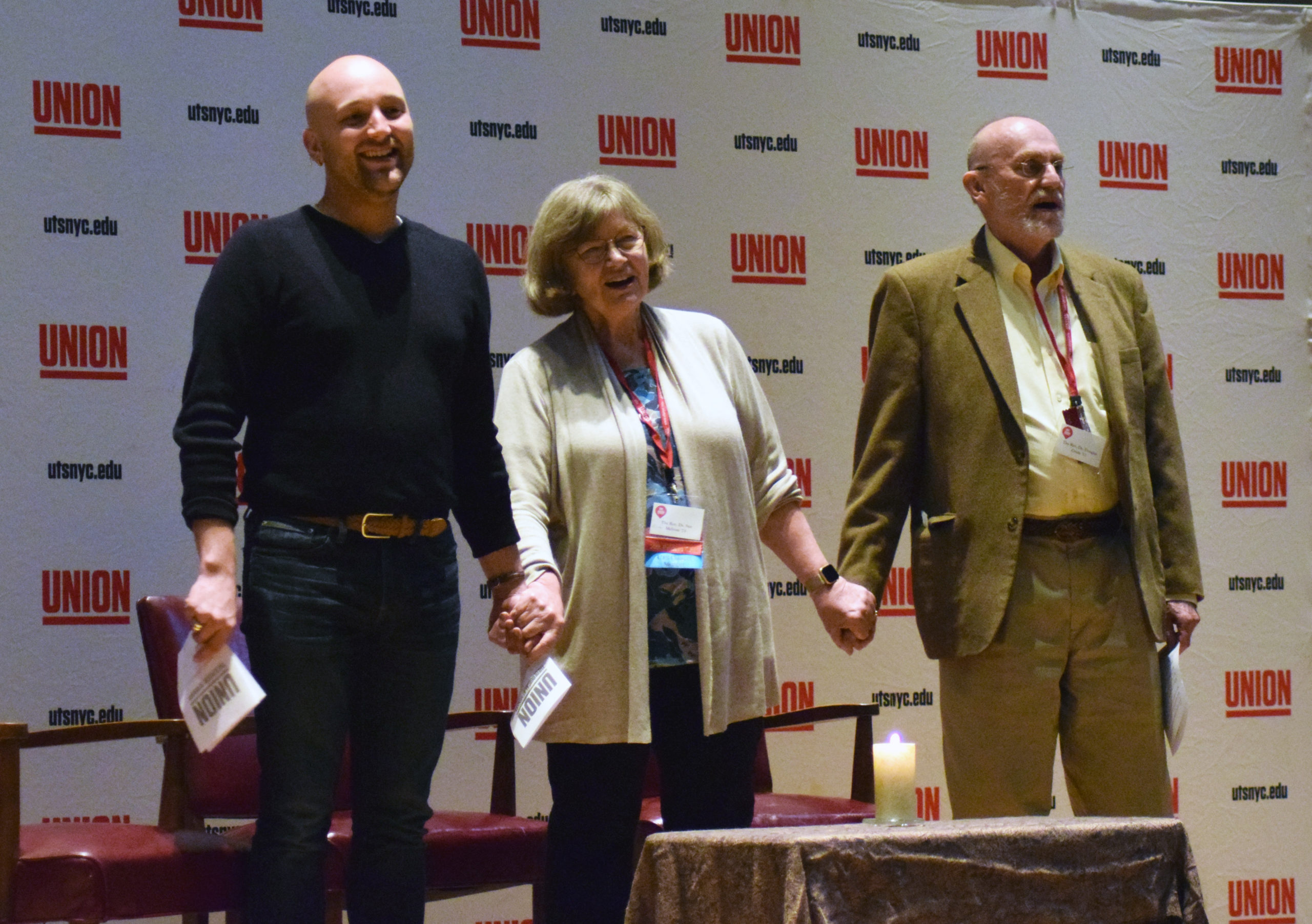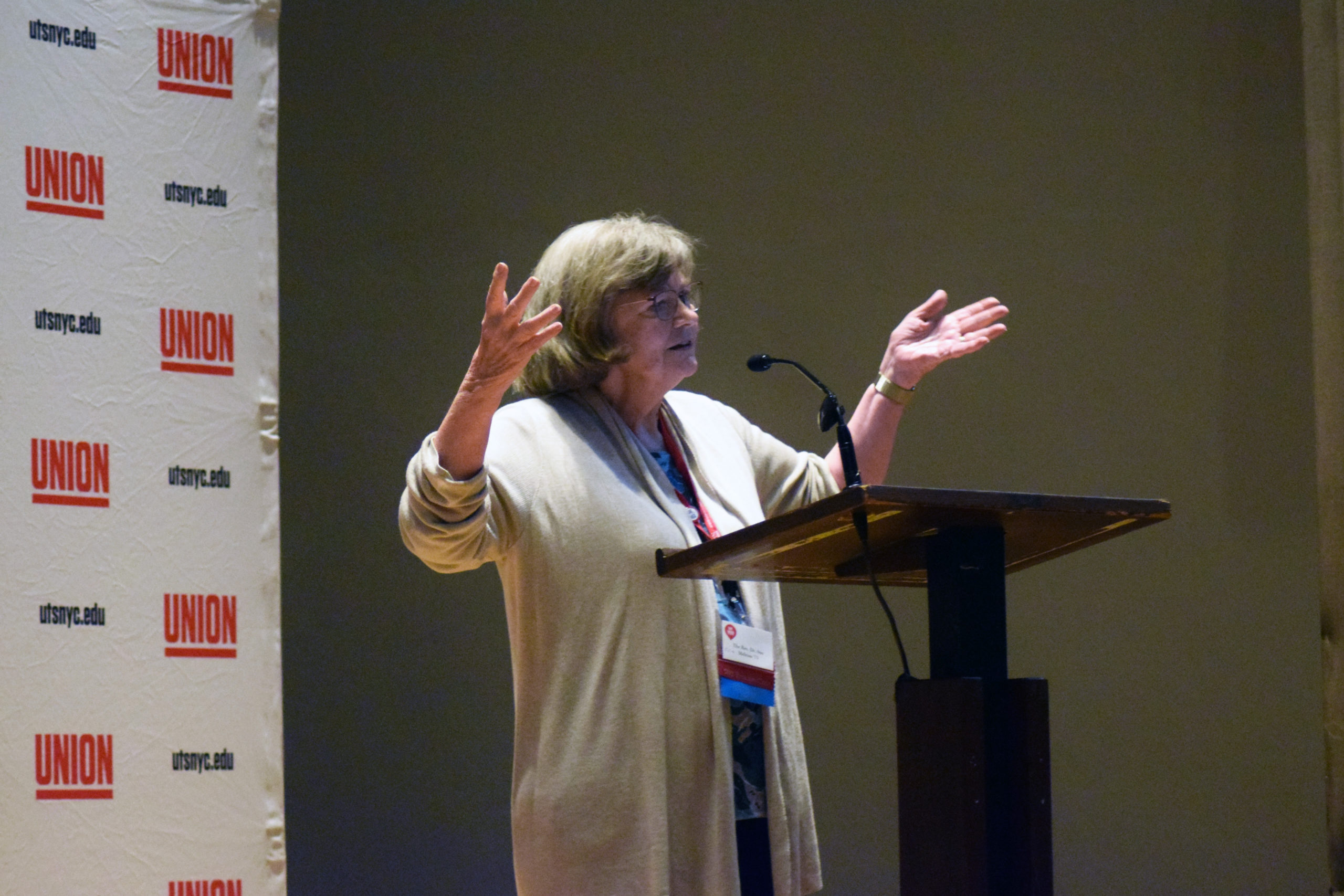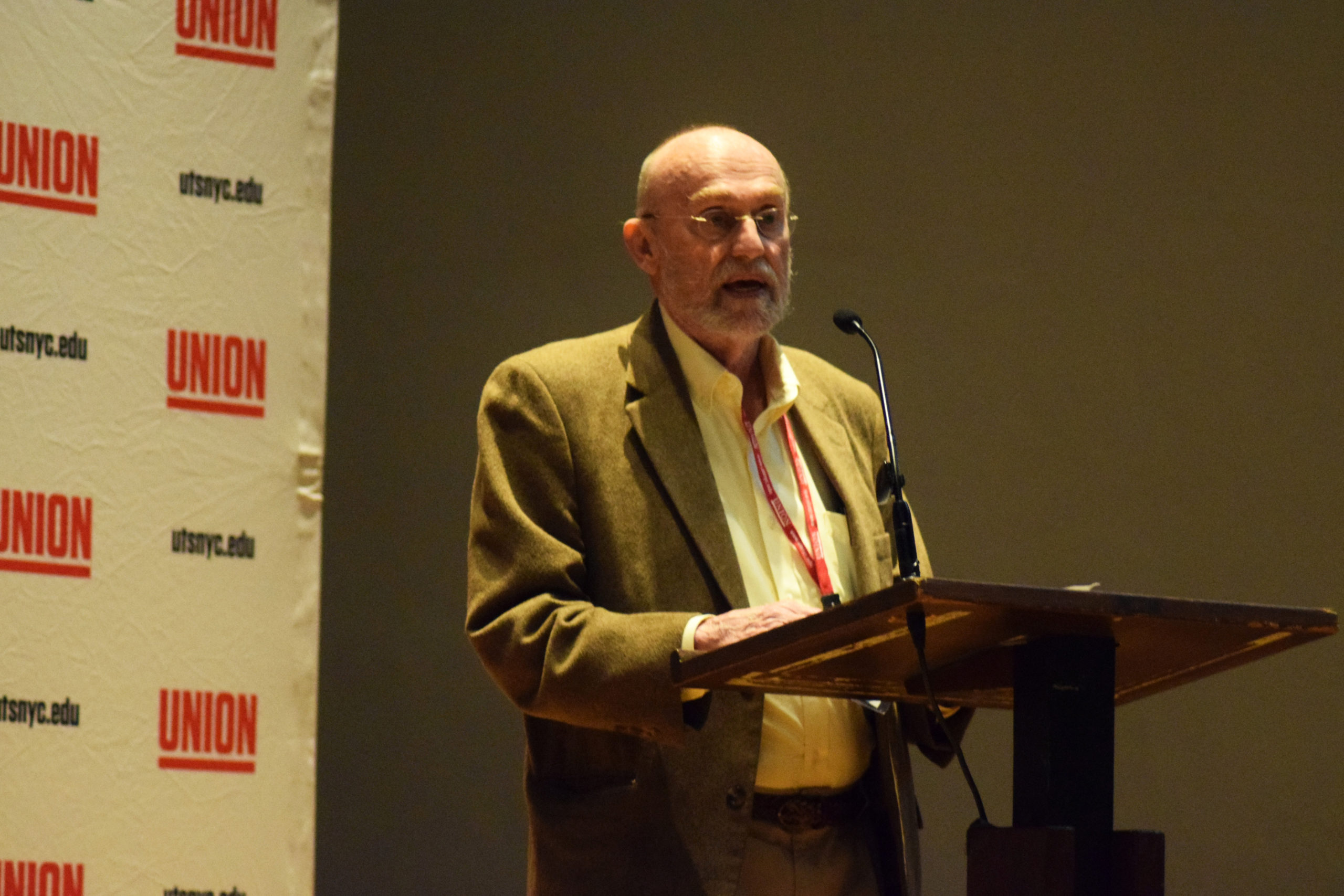6 min read
During this year’s One Union Reunion celebrations, we held a 50th Anniversary Chapel in honor of our Union alums who graduated in 1970, 1971, 1972, and 1973. During the chapel service two of Union’s 50th Anniversary class alums, Sue Ellis Melrose and Douglas Grote, shared their heartfelt reflections—and we are honored to be able to share them here with you.

Sue Ellis Melrose ’73
“If you go to Union, you will learn how to think,” said the campus minister encouraging me to go to seminary. A product of Oklahoma Presbyterians, I entered Union in the fall of 1970 amidst anti-war and civil rights activism with classmates who were almost all white, 22 year old brash Baby Boomers with more than a few of the guys here simply to avoid the draft. The impact of feminism was personal: I was one of 13 women among 68 M.Div. graduates in 1973, triple — four times? — the number in that program in prior years, more than any other seminary in the country. Many of us were “the first woman”: Carter Haywood among Episcopalians; Joyce Stedge, the first woman ordained in the Reformed Church of America; those of us in mainline churches that had been ordaining women were often the first in our presbytery or conference. It took several more years before it happened for Lutheran women.
I arrived at Union hungry to tackle big social justice issues. Social and political ethics held big appeal for me given my interest in activism — community organizing, electoral politics.What I had not expected was the impact of learning biblical exegesis.
“Exegesis” was a new word for me. But sure enough, seeds for learning how to think were planted as I learned the discipline: Scanning the larger issue, putting it in context, beginning to look at the particulars and deciding what I knew and I didn’t know — what simply aroused my curiosity, enlarging my faith and comprehension. I learned another new word: “hermeneutics,” which began to take shape in my theology and ethics. The remnants of Niebuhrian realism led me to slow down — and think. The socio-political critique in emerging liberation theologies reframed “justice.”
At the same time, seeds were planted revealing the power of liturgy. In chapel worship, we began to write and use inclusive language. It sounded awkward at first, but soon developed a cadence of its own—and it was empowering, enlarging our image of God or maybe more accurately said, God reshaping how we saw ourselves as ones made in the image of God.

More about ritual and where it met action: I remember when an elaborate plan for a student anti-war protest was developed for the upcoming Holy Week. It would start with certain arrest on Palm Sunday, fasting in jail throughout Holy Week – like others had done before, they would post collateral on Easter Sunday being freed — press releases were prepared to send back to hometown newspapers and letters to family and friends so they would change their minds about the war.
In a class discussion about the protest plans, visiting Brazilian theologian Rubem Alves stated, “Fasting for peace is like dancing for rain.”
He waited for objections to end. He went on: dancing for rain is an act of hope and faith. He wasn’t dismissing the efforts, but enlarging them to see the liturgical, the spiritual side of the act.
These seeds planted at Union sprouted for me, when, after brief stints in campus ministry and casework, with doors then a bit ajar for women, I moved into parish ministry. Serving churches in the Bronx, the suburbs of New Jersey, Metro Detroit, and semi-retired in Wisconsin, I exegeted biblical passages preparing sermons and developed a hermeneutic leading churches in communities where the global is always local. And, oh, yes, marrying seminary classmate Paul, raising together two great kids now serving in professions of their own. The seeds from Union — teaching me to think and to pray with hope — provided sustenance for ministry: breaking bread amidst the brokenness of bankruptcies of auto companies, doing funerals for the early victims of AIDS, and supporting school boards addressing gay rights and school violence; challenging racism in mortgage red-lining and township zoning, singing “Jesus Loves Me’ with a dementia patient, gathering with local clergy of the three Abrahamic faiths in the shadow of 9-11, praying with those waging battle against cancer and addiction, comforting the grieving during COVID isolation. The full-blown plants from those seeds became full-throated celebration during baptisms and weddings in my mainline Protestant denomination that in 50 years’ time were no longer only white and straight.
My hope for current and future students of Union is that they too will discover the seeds for knowing how to think with depth and integrity; that seeds of empowerment will sprout through liturgies of hope and redemption; that they are sustained in faith for “the long haul” working toward justice and the renewal of God’s Creation. I give thanks to God for the seeds planted in us here at Union Theological Seminary where I learned to think – and to pray — some 50 years ago.
Douglas Grote ’72
What seeds were planted in me during my time at Union? There were far too many to count, but, boil them down, and there’s one essential: do the right thing, as I’m sure you all know well, like how Isaiah puts it, “learn to do good; seek justice, rescue the oppressed, defend the orphan, plead for the widow.” The late 1960s and early 1970s were heady political times, like today. But at Union there was, and I’m sure still is, no bargaining with those kind of frequent admonitions from Genesis to Revelation for us to just do the right thing. So, in 1969 I was ready for an activist life, but I also had a young family, meaning I also needed a job. So I drove a cab.
You’re off on your own on these mean streets just trying to survive and earn a living like everyone else, but I decided I’d try a bit of activism while I worked, which meant picking up anyone who was going anywhere in the five boroughs. I probably don’t have to tell you about cab drivers’ reputation in this regard. One night after dropping off a fare in the upper Bronx, I headed south. At a light, a crowd surrounded my cab pleading with me to take a bleeding man and woman to the emergency room. They opened the back door, and shoved them in. 
Somehow, I pushed aside my shock, and took off. I saw a police car, and, assuming that they’d put on the siren and quickly rushed me to the hospital, I stopped, and asked for help. They got out of their car, and started to interrogate the victims. Something got in me, and I took off, but they didn’t pursue me. I got to the hospital, and the moaning couple was rushed in. I went back to the garage on 125th St. and asked the manager what to do about the blood. He told me to wash it out with a hose. I did. That shorted out the cab’s electrical system. There were no more cabs available.
As I walked home up Broadway, frustrated with what little money I made for the night, I nonetheless started to glow inside having hopefully helped to save some lives. That adventure on the outskirts where job and justice meet oppression and injustice multiplied itself over and over again out on these streets, sometimes that dramatically, most often not, by just sharing an ordinary kindness that softens practically everyone on earth. How do I know? Because this is NYC, where the world’s marginalized can thrive, and I drove them in my cab as I asked them all about themselves.
I tried to get my presbytery to approve my “street ministry” as sufficient for my ordination requirements; in the end they wouldn’t buy it. That was ok, I learned my lessons, and figured through other influences at Union, like James Cone, Paul Lehman, Walter Wink, Tom Driver and Ann Ulanov that by some strange alchemy my place on our Lord’s boundaries between justice and injustice would be best served as a pastoral psychotherapist. I’m still practicing, and I continue activism with a non-profit for economic justice, and a local one to deal with Christian nationalists. It still makes me glow inside. Thanks, Union.
